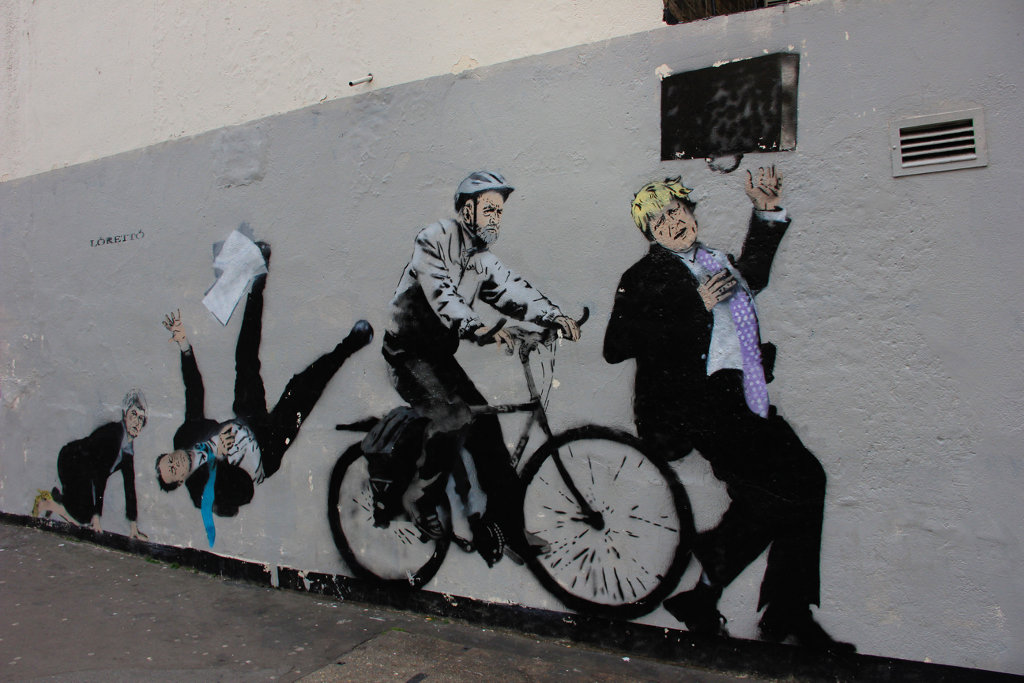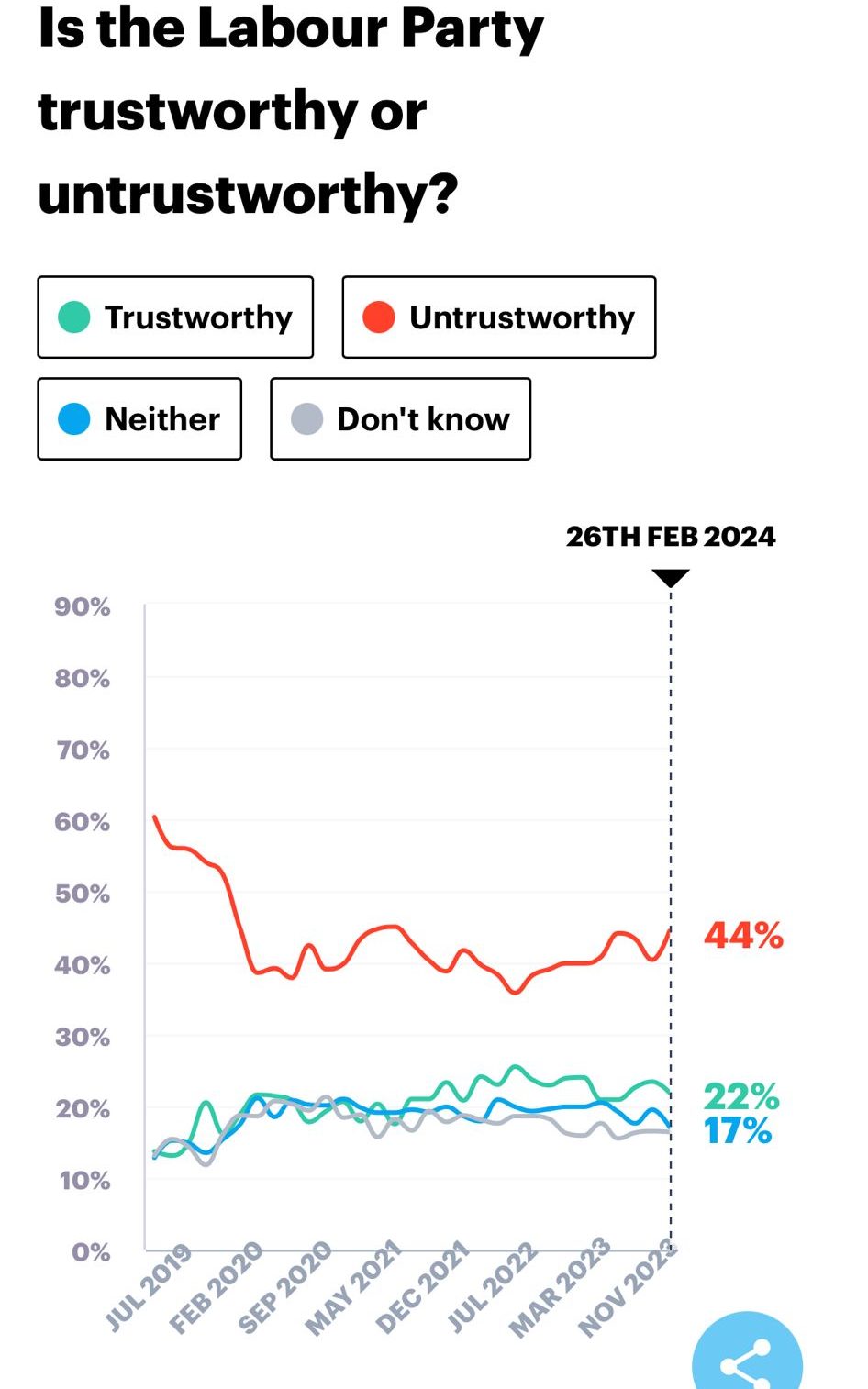Divided Parties, A Receipt for Mistrust?

The British political party system has been one that has been dominated by two parties from the Whigs and Tories in the 1700s, the Tories and Liberals in the 1800s and the Conservatives and Labour in the 1900s. In recent years both Conservatives and Labour have experienced divides within the parties, which raises the question of how do these divides effect the public perception of the parties?
In 2015 the Conservative party was split between those who wanted to leave the European Union (e.g. Boris Johnson, Michael Gove) and those who wished to remain (e.g. David Cameron, Theresa May). The split within a party on differing views highlighted the tensions within the Tory party, meaning people start to question the stability of the party (Hayton, 2018). Trust of a party is very important as the party is the main representational link for citizens in government and distrust could lead to a decline in political engagement and even a decline in voters (Bélanger & Nadeau, 2005). In a report produced by King’s Collage London, it highlights how confidence and trust in UK political parties in 2022 was one of the lowest of countries surveyed at only 13%. A figure like this can suggest that the British public are feeling more and more disconnected to those who are supposed to represent them in parliament and this could then lead to partisan dealignment. This is when an individual decreases support for a party they used to have strong support of, these were usually seen to be Conservative and Labour (Crewe, et al., 1977).
Another example of when a party has been divided is when the ex-leader of the Labour party, Jeremy Corbyn, said that antisemitism in the Labour party was being overstated after a EHRC report found there to be “unlawful acts of discrimination and harassment” within the party (Equality and Human Rights Commission, 2020). His leadership of the Labour Party had been divisive leading to the general election defeat in 2019.

( https://yougov.co.uk/topics/politics/trackers/is-the-labour-party-trustworthy-or-untrustworthy )
The poll highlights how those who found the Labour party untrustworthy decreased drastically after Jeremey Corbyn ceased to be leader and then suspended as a party member. This could suggest that trust in a party can be greatly affected by just one person. The graph could also suggest that trust would increase after a divide in a party is gone, as trust in the Labour party can be seen to gradually be increasing since 2021. Polls such as these are useful as they help show how scandals within party can greatly affect how the public views the party and potentially vote for them. Since there has not been a general election since 2019 it is harder to judge the impact the EHRC report will have on the Labour party, but most recent by election results have been favourable.
Out of all the types of institutions in the government political parties had the lowest levels of trust.

This data produced by the Office for National Statistics highlights how much distrust there is for political parties. It highlights a major problem the UK government has as the public lose faith in those who are there to represent them. If a person is to have more trust for a party, they are more likely to vote for the ideology they believe in (Okolikj, et al., 2024). If trust in political parties continues to decrease, there could be a fear that less would turn out to vote. For the large parties of Conservatives and Labour it may seem like not such a big problem, however if voting numbers did not decrease, voters could instead turn to the smaller parties such as the Green party or Reform to put their trust in. This was particularly evident in the Rochdale by-election on 29th February 2024 when George Galloway won and the three main parties only gained 27% of the vote in total (McKiernan, 2024).
A major question from this evidence is, how can parties get trust back?
Firstly, the party could gain trust back by acting in the interest of citizen and giving them what they want (Winsvold, et al., 2023). This could be from funding the NHS more to helping decrease the level of rent. By showing the public the party can do things that benefit them in everyday life, trust may be gained back. Second, leadership and are they acting in the best interest of the citizen? What are their morals? As seen in the Labour party many did not trust Jeremy Corbyn and as soon as he was no longer the leader and then suspended, trust in the party increased.
Overall, trust is a major factor in how political parties are viewed. As trust in political parties is low the next general election should be an interesting reflection on how the publics view has changed on the Conservative and Labour parties.
Bibliography
Bélanger, E. & Nadeau, R., 2005. Political Trust and the Vote in Multiparty Elections: The Canadian case. European Journal of Political Research, 44(1), pp. 121-146.
Crewe, I., Sarlvik, B. & Alt, J., 1977. Partisan Dealignment in Britain 1964-1974. British Journal of Political Science, 7(2), pp. 129-190.
Equality and Human Rights Commission, 2020. Equality and Human Rights Commission. [Online]
Available at: https://www.equalityhumanrights.com/media-centre/news/investigation-antisemitism-labour-party-finds-unlawful-acts-discrimination-and
[Accessed 29 February 2024].
Hayton, R., 2018. Brexit and The Conservative Party. In: P. Diamond, P. Nedergaard & B. Rosamond, eds. Routledge Handbook of the Politics of Brexit. London: Routledge , pp. 157-166.
McKiernan, J., 2024. BBC News. [Online]
Available at: https://www.bbc.co.uk/news/uk-politics-68443430
[Accessed March 1 2024].
Okolikj, M., Goubin, S., Stiers, D. & Hooghe, M., 2024. Trust in political parties and ideological proximity voting in Europe: the role of trust in political parties as a heuristic mechanism. Journal of Elections, Public Opinion and Parties, 34(1), pp. 116-135.
Winsvold, M., Haugsgjerd, A., Saglie, J. & Segaard, S. B., 2023. What makes people trust or distrust politicians? Insights from open-ended survey questions. West European Politics , 47(4), pp. 759-783.
In a media saturated world where public perceptions of parties are everything, this blog post was attention-grabbing from the beginning. The writer showed convincing analysis by pointing out the impact that declining trust in political parties can have on the political nature of a society. Incorporating figures, followed by an explanation of what they tell the reader, displayed thorough investigation into vitality of government representation. References made to the graph that the writer included show a competent ability to consider many points of view, with critical mentions of the limitations of the statistics as well as their strengths. Additionally, discussions on the influence of trust demonstrated a cogent, original argument on how pivotal gaining trust is for voting patterns and overall party support. The example of Jeremey Corbyn, relating to the power of party leaders showed another compelling element to the role of trust for parties. Questioning how trust can be gained back was an impressive point of discussion also, as it again highlighted how crucial public perceptions of parties are. To enhance these suggestions even further, it would have been beneficial to see an expansion on the writer’s own thoughts on how best to gain trust back. A more critical stance on methods of gaining trust back would have added to an already excellent piece of writing that clearly expresses key aspects of the makeup of political parties in Britain.
This blog offers a thorough analysis of the impact of divided political parties on public trust and engagement. Incorporating examples such as the Brexit split within the Conservative Party and the controversies surrounding Jeremy Corbyn’s Labour leadership along with inclusion of data from polls, reports, and election results adds credibility to the analysis and strengthens the author’s arguments. For example, citing poll data from YouGov to illustrate shifts in public trust in the Labour Party following Jeremy Corbyn’s leadership by using such data, strengthens the argument at hand. The blog clearly explains the internal dynamics of political parties and their leadership and how this impacts public trust in the short-term. However, this blog could have looked deeper into the long-term consequences of such divisions. Overall, this blog is very well-written and clearly structured with effective examples to strengthen the points at hand.
This blog provides a great overview concerning political divides and their impact on public trust, the use of statistics and examples really helps the reader engage with the already interesting subject topic. The discussion on how the Brexit split provided a new form of tension that had not been seen in a long time was very interesting how this has also led to divides within the public also. However, the most personally engaging element was surrounding Jeremy Corbyn, the antisemitism and how this led to a huge decline in trust in the Labour Party. I would be interested to see how the author feels the Labour Party has or has not overcome this.
This blog offers a very interesting insight into trust within British politics. Particularity, trust of the two main political parties. It does a good job of showing how both main parties, Conservative and Labour have had their own internal issues and how this has resulted in public opinion declining. Moreover, i also think it was a useful point when it analysed that sometimes individuals can effect the whole parties image, for example Jeremy Corbyn. It would be useful to know if the blog thinks that Labour can come back from this. It was also very useful to see that it had set out ways for the parties to regain public trust.
This blog post analyses the impact of internal divides within political parties on public perception and trust. The blogpost author effectively highlights key instances of party divisions within both the Conservative and Labour parties, shedding light on how these internal conflicts can influence voter trust and engagement. One aspect that could be further explored is the role of party leadership in shaping public perception and trust. While the post touches on the impact of Jeremy Corbyn’s leadership on trust in the Labour Party, it would be insightful to delve deeper into the broader implications of leadership styles and decision-making processes within political parties. For example, how do leadership changes and shifts in party ideology affect public trust and confidence in party leadership? Exploring these dynamics can provide valuable insights into the factors driving shifts in public opinion and trust.
Moreover, the post could benefit from discussing the role of transparency and accountability in rebuilding trust in political parties. As the author notes, trust in political parties is essential for maintaining democratic legitimacy and citizen engagement. Therefore, parties must prioritise transparency in their decision-making processes, communicate effectively with the public, and hold themselves accountable for their actions. The blogpost reminds us that as the next general election approaches, parties must prioritise efforts to rebuild trust and confidence among voters, ensuring that they remain responsive to the needs and concerns of the electorate.